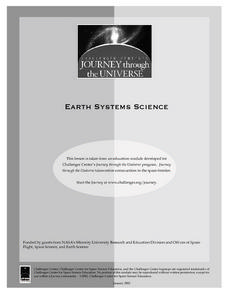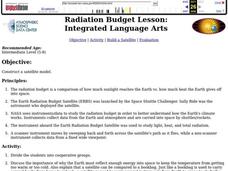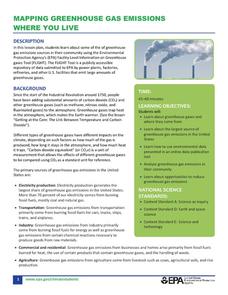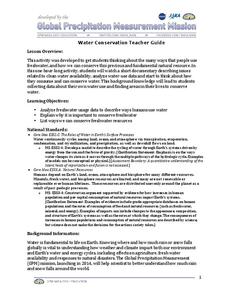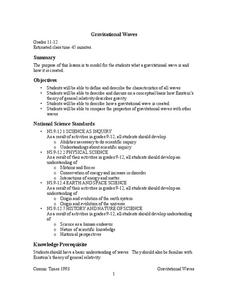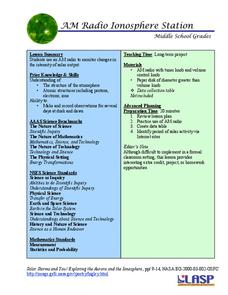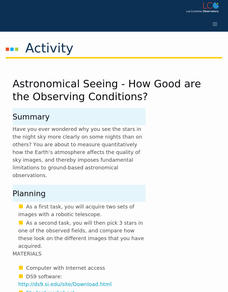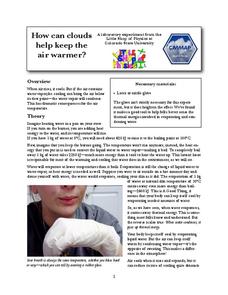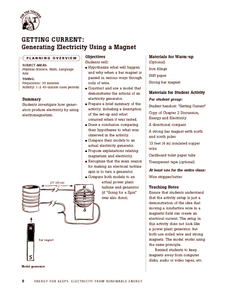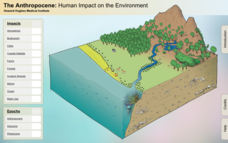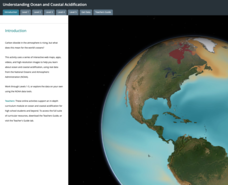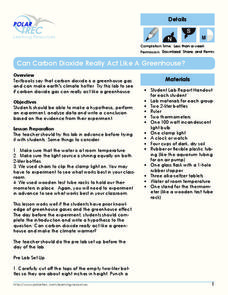Curated OER
Influential Scientists Vocabulary Quiz
In this science vocabulary worksheet, learners match the names of 19 science professionals with the definition. Example: Ichthyologist (studies fish).
Curated OER
Is There Water on Mars?
Students decide whether or not there is or has even been water on Mars. They analyze temperature and pressure data from the Pathfinder mission to Mars, and then they analyze images of Mars, interpreting the landforms they see and...
Curated OER
In the Eye of the Hurricane
In this science worksheet, students read about temperature and thermal energy in a hurricane. Students also draw their own hurricane and label 5 different parts.
Curated OER
Ocean Water
In this ocean water worksheet, students use 6 given terms related to ocean water, early Earth and ocean components to complete the sentences. They also answer 4 questions about seawater, the effects of volcanoes on oceans and ocean life.
Curated OER
Weather: It Works, or Not?
Young scholars discover the techniques meteorologists use to examine the atmosphere. In groups, they build their own weather station and observe the various weather conditions. They identify the types of weather patterns that allow the...
Curated OER
Human Impact on the Environment
In this environmental science instructional activity, students complete a crossword puzzle with 26 questions about human impact on the environment.
Curated OER
As the Sun Burns
Students examine the types of light the sun gives the Earth. They describe the electro-magnetic spectrum and how to protect themselves from different types of light. They identify the layers of the atmosphere as well.
Curated OER
The Water Cycle Game
Learners study the path and forms of water through Earth. In this water cycle lesson, students role-play water as it moves throughout the Earth. Learners play the water cycle game and complete various stations to learn about water forms...
Curated OER
Weather Wordsearch
In this science worksheet, learners find the words that are associated with the measurement of weather changes. The answers are found at the bottom of the page.
Curated OER
Radiation Budget
Students examine the radiation budget and the launching of the Budget Satellite. They role-play as designers of the satellite and construct one with a power source, instruments, and sensors. they explain how their satellite functions...
Curated OER
The Water Cycle
Your class sets up a mini water cycle model to examine the process. Then they watch an animation, following a water molecule through the cycle. A well-developed lab sheet guides learners through the lesson and a PowerPoint presentation...
US Environmental Protection Agency
Mapping Greenhouse Gas Emissions Where You Live
After investigating the US Environmental Protection Agency's climate change website, your environmental studies students discuss greenhouse gas emissions. They use an online interactive tool to look at data from power production...
University of Colorado
The Moons of Jupiter
Can you name the three planets with rings in our solar system? Everyone knows Saturn, many know Uranus, but most people are surprised to learn that Jupiter also has a ring. The third in a series of six teaches pupils what is around...
Curated OER
Water Conservation
Open learners' eyes to the challenge of finding safe drinking water – something we often take for granted in our country. The PowerPoint presentation includes images, graphs, diagrams, and even a video to stimulate discussion on how we...
Mr. Hill's Science Website
Solar System Fact Sheet
Here is a fantastic, educational handout packed with information and facts not only about the planets in our solar system, but also regarding major moons and their surface features, dwarf planets, comets, and asteroids.
NASA
Gravitational Waves
Young scientists participate in a hands-on experiment to explore Einstein's theory of relativity in a creative manner. They investigate various waves and compare their characteristics as they discuss how each wave is created....
PHET
AM Radio Ionosphere Station
Tune in! Young scientists use an AM radio at home to monitor solar output. The long-term project would be ideal in a flipped classroom or as an out-of-class project.
Las Cumbres Observatory
Astronomical Seeing - How Good Are the Observing Conditions?
Why is star gazing easy on some nights and difficult on others? Pupils aim to quantify the answer in an enlightening astronomy lesson. After collecting images from an online robotic telescope, they measure the brightness of images using...
Colorado State University
How Can Clouds Keep the Air Warmer?
Condensing water warms the air around it. Young scholars consider this concept as they experiment with air temperature around evaporating and condensing water vapor. They simulate the formation of clouds to experience the associated...
Energy for Keeps
Getting Current: Generating Electricity Using a Magnet
Give your class a magnetic charge with this creative experiment designed to teach emerging scientists about electromagnetism. Pupils construct a model that demonstrates the function of an electrical generator and test this creation in a...
K20 LEARN
This Is How the World Ends: Coronal Mass Ejections/Space Storms
Is this the end of the world as we know it? Pupils prepare for a coronal mass ejection during a lesson from the K20 Center. The activity combines video and Internet research in a collaborative assignment that focuses on public safety...
Howard Hughes Medical Institute
The Anthropocene: Human Impact on the Environment
Will human existence define an epoch? Many scientists think we are in a new epoch, the anthropocene, defined by humans and our impact on the environment. An online interactive demonstrates the immense impact humans have had on every part...
NOAA
Ocean Acidification
Carbon dioxide is on the rise; does that also mean a rise in danger to humans and animals? Scholars learn what that means for the environment and more specifically the ocean. They examine data on the pH of different ocean areas and learn...
Polar Trec
Can Carbon Dioxide Act Like a Greenhouse Gas?
Ninety-seven percent of scientists who study climate agree that human activity is warming the planet. Learners explore carbon dioxide as a greenhouse gas, a gas causing this warming, through a hands-on experiment. Once complete, they...






